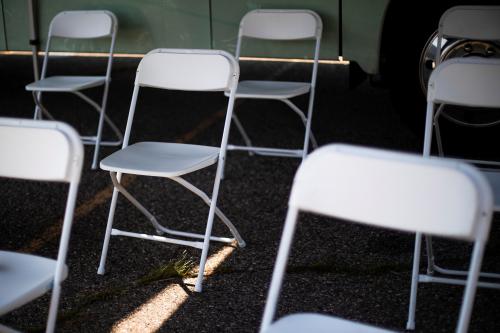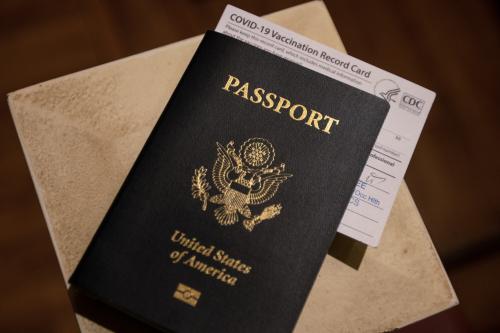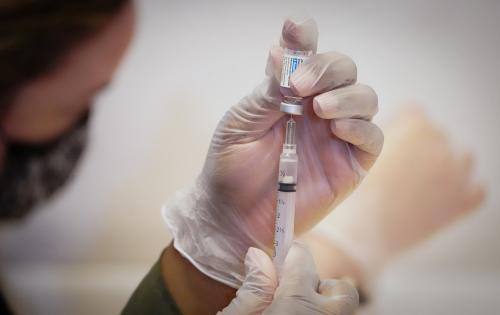July represented an inflection-point in public opinion about the pandemic. As COVID-19 infections from the delta variant spiked, Americans’ expectations about the pandemic’s course turned gloomy, public approval for President Biden’s handling of the problem declined, and support for vaccine mandates solidified.
The shift from optimism to pessimism was abrupt. In June, according to Gallup, 89% of Americans believed that the pandemic was getting better, compared to only 3% who thought it was getting worse. By the end of July, only 40% believed that it was getting better (a drop of 49 points), and 45% thought it was getting worse (an increase of 42 points). Changes of this speed and magnitude rarely occur in public opinion, and they point to the dramatic impact of the delta variant on the nation’s outlook. The reassessment of current conditions has triggered changes in public expectations. In June, most Americans thought that the pandemic would end in months or even weeks, and only 17% believed that the pandemic would last into 2022. Now, 42% think it will persist into next year. As the tunnel has gotten longer, the proverbial light at the end of it has grown dimmer.
Not surprisingly, worries about contracting COVID-19 increased from 17% to 29% during the past months. Unfortunately, the bulk of the increased worry—from 18 to 33%—occurred among vaccinated Americans, while concern among the unvaccinated rose by only 5 points, from 15 to 20%. This suggests that the impact on vaccination rates may be more modest than most public health officials are hoping.
A Kaiser Family Foundation survey released on Wednesday helps explain this gap. According to KFF’s researchers, unvaccinated adults are much less worried about the coronavirus (including the delta variant) than are the vaccinated and have less confidence in the safety and effectiveness of the vaccines. Three quarters of unvaccinated adults say they are not worried about getting seriously ill from the virus, just one quarter say that the vaccines are effective and keeping vaccinated people from getting seriously ill or dying. In the face of massive evidence to the contrary, more than half of unvaccinated adults regard getting vaccinated as a bigger risk to their health than is getting infected with the coronavirus. Only one in five of the unvaccinated say that the spread of the delta variant has made them more likely to get vaccinated. These data do not support hopes that the recent outbreak will suffice to increase vaccination rates enough to bring the pandemic under control.
“In the face of massive evidence to the contrary, more than half of unvaccinated adults regard getting vaccinated as a bigger risk to their health than is getting infected with the coronavirus.”
The successful management of the pandemic has been one of the pillars of the Biden administration—and of approval for the way Mr. Biden is handling his job. But the recent surge in cases has taken its toll. Between the end of May and the beginning of August, according to a new Quinnipiac poll, public approval for the president’s handling of this problem fell by 12 points, from 65 to 53%, while disapproval rose from 30 to 40%. It is no accident that Mr. Biden’s overall job approval has fallen to the lowest point of his presidency, according to the most widely followed polling averages.
Since the beginning in March 2020, government’s response to the pandemic has occasioned intense controversy, much of it along partisan lines. Although the level of conflict remains high, recent events have solidified public support for the most intrusive policy government can undertake—mandatory vaccinations. According to a survey conducted by the Covid States Project, 64% of Americans now support mandatory vaccinations for everyone, and 70% support them as a requirement for boarding airplanes. More than 6 in 10 say that vaccinations should be required for K-12 students returning for in-school instruction as well as for college students attending classes at their institutions. And the most recent Economist/YouGov survey found that more than 60% support mandatory vaccinations for frontline workers—prison guards, police officers, teachers, medical providers, and the military—and for members of Congress as well.
“Solid majorities of every racial and ethnic group support vaccine mandates, as do Americans at all levels of age, income, and education.”
Political divisions on this issue have not magically vanished. Only 45% of Republicans support vaccine mandates, compared to 84% of Democrats. Still, solid majorities of every racial and ethnic group support vaccine mandates, as do Americans at all levels of age, income, and education. White people and rural residents are more likely to resist mandates, which helps explain why only three states—North Dakota, South Dakota, and Wyoming—report less than majority support. Surprisingly, women are substantially less likely than men to accept mandates, indicating that fears about vaccines’ effects on fertility and the genetic code may be especially powerful in this group.
Overall, the data suggest that mayors, governors, and the Biden administration will enjoy the backing of the people if these officials decide that new circumstances require tough measures they have hesitated to impose until now. No doubt the loudest voices will protest this move as a violation of their civil rights. But there is a reason why for more than two centuries, courts at every level have consistently upheld governments’ constitutional powers to safeguard public health and safety with measures that require citizens to do things that they do not want to. In the end, government will be judged by the effectiveness of their policies, and officials who flinch from doing what public health and safety require will be judged harshly by most of the citizens they serve.
The Brookings Institution is committed to quality, independence, and impact.
We are supported by a diverse array of funders. In line with our values and policies, each Brookings publication represents the sole views of its author(s).








Commentary
Vaccine mandates are more popular than you think
August 5, 2021